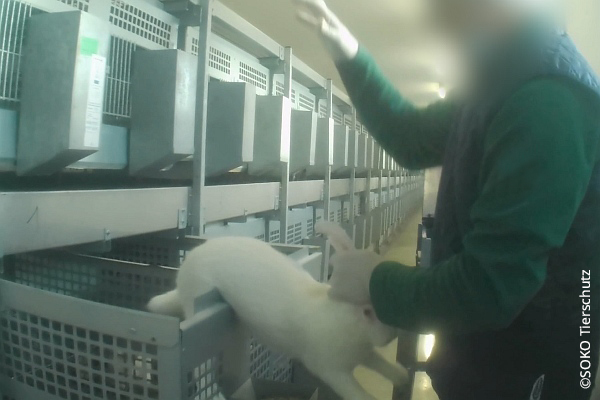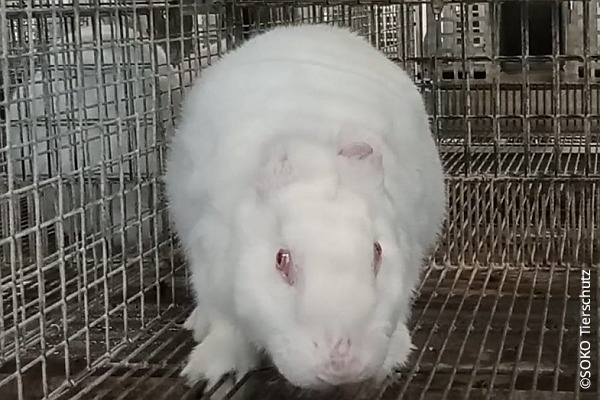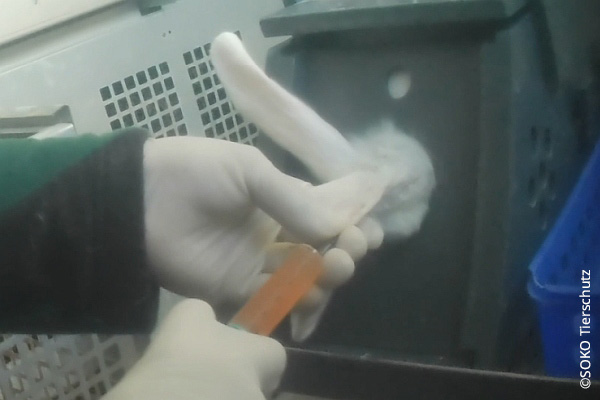Shocking discovery at a farm
- News
How rabbits suffer for antibody production
The organization SOKO Tierschutz went public yesterday with undercover footage taken at a seemingly idyllic farm. The recordings reveal: at the Asamhof in Kissing near Augsburg, thousands of rabbits are kept under appalling conditions for animal testing. The animals are used for antibody production, even though animal-free alternatives have long been available. Doctors Against Animal Experiments explain the background of these tests and the possibilities of animal-free antibody production.
The farm outwardly appears to be a picturesque family business. The father and sons run several agricultural farms, advertising organic strawberries, flour, and tofu. They also sell rabbit meat from their own slaughter. Now it has emerged that the Asamhof in Kissing has been quietly engaging in yet another form of animal exploitation as an additional business branch.
An undercover investigator from SOKO Tierschutz worked on the farm for three months. According to his report, around 3,000 to 4,000 rabbits are kept in small cages, mostly individually. He documented multiple cases of animal cruelty: rabbits thrown into cages, grabbed and lifted by their ears, and sick animals left without adequate medical care. The actual “use” of the rabbits is also shocking: they are subjected to animal experiments.
For this, they are crammed into tight boxes with only their heads protruding. They receive injections, their blood is repeatedly drawn. In the end, the animals are anesthetized, a needle is inserted into their hearts, and their blood is pumped out.
From the outside, nothing hints at these animal experiments. Only a short newspaper article from 2023 confirms that rabbits there are used to produce medicines and medical products for human use (1). These involve so-called polyclonal antibodies—the production method matches the investigator’s observations.
Production of polyclonal antibodies
Rabbits are first injected with the substance against which antibodies are to be generated. To increase production, several additional immunizations follow—for example, two to four injections within six to twelve weeks. During this time, the animals have blood repeatedly drawn, each time up to ten percent of their total blood volume. In this way, blood can be harvested over several months. At the end of the experiments, the rabbits are killed, and antibodies are isolated from their blood.
Polyclonal antibodies are produced extensively in rabbits. In 2023 alone, 32,970 animals in Germany were used for this purpose (2). And the market is lucrative: in the same year, revenues from polyclonal antibodies in Germany amounted to around 86 million euros—about half of that coming from antibodies derived from rabbit blood (3).
Use of rabbit-derived antibodies
According to information from the SOKO investigator, the farm supplies companies including Neovii and Siemens. Siemens uses antibodies for diagnostic lab tests—and is already a familiar name when it comes to animal experiments on rabbits and inhumane housing conditions (4). As early as 2022, the company made headlines after the German Animal Welfare Office (now Aninova) uncovered a scandal-ridden company in Baden-Württemberg (5) that kept rabbits under cruel conditions and supplied antibodies to Siemens. Even today, Siemens apparently does not sufficiently monitor its suppliers.
Neovii produces the drug Grafalon. It is used to prevent or treat rejection reactions after organ transplants. For production, rabbits are immunized with human immune cells. Their immune systems then generate antibodies against these cells, which are used to produce Grafalon.
There is no doubt that drugs like Grafalon or diagnostic tests are of great value to patients. But the crucial question is: must their benefits come at the cost of the suffering and death of thousands of rabbits?
Are rabbits necessary for antibody production?
According to EU Directive 2010/63/EU, animal experiments may only be conducted if no other animal-free methods are available (6). German animal welfare law also allows them only if they are indispensable and the goal cannot be achieved by alternative methods. Yet animal-free methods for antibody production have long been available (7).
The most widely used method is the so-called phage display technology (8). Here, B cells, for example from human blood, are used to obtain the genetic information for antibody production. This information is inserted into phages—viruses that infect bacteria. The phages then present antibody fragments on their surface. From vast phage libraries, suitable antibodies for a given antigen can be specifically selected. The genetic information is then transferred into production cell lines, which generate antibodies in any desired quantity—completely without animals.
The EU reference laboratory ECVAM therefore already recommended in 2020 that antibody production should transition to animal-free methods (9). The technology is well established and can deliver antibodies with superior properties compared to those generated in animals.
One example is the antibody Adalimumab (Humira®). It was developed using phage display and is used to treat a range of inflammatory autoimmune diseases such as rheumatoid arthritis and Crohn’s disease. Global sales of Humira in 2023 amounted to nearly 12 billion euros (10). Especially in medicine, such antibodies offer advantages like lower immunogenicity and more reproducible manufacturing.
With phage display, antibodies can be generated completely animal-free against various targets. Different such antibodies can also be combined, resulting in so-called multiclone antibodies, which behave similarly to polyclonal antibodies produced in animals and can be used in the same way.
Animal-free antibody production in Germany
There are also companies in Germany dedicated to animal-free antibodies. The company Abcalis in Braunschweig uses phage display technology to develop animal-free antibodies, including multiclone antibodies that can replace animal-derived variants. For this commitment, the company received the 2022 award for animal-free antibodies from our umbrella organization, the European Coalition to End Animal Experiments (ECEAE) (11).
The company Phaeosynt from Hanover is also pursuing animal-free methods: it produces vegan antibodies in diatoms. With Hey mela, the company recently launched the world’s first vegan pregnancy test (12).
These examples demonstrate that antibodies can be produced in high quality without animal suffering.
Conclusion
The investigation by SOKO Tierschutz reveals how thousands of rabbits suffer and die for antibody production. Yet animal-free methods are already available, scientifically established, and economically successful.
Given the existing animal-free technologies for antibody production and the legal obligation to avoid animal experiments, companies sourcing rabbit blood from the Asamhof are obligated to immediately transition their products to animal-free antibodies.




References
- Schmid A.K. Für medizinische Zwecke: Kissinger Kaninchenmastanlage wird vergrößert. Friedberger Allgemeine, 02.12.2023 >>
- Verwendung von Versuchstieren im Berichtsjahr 2023. Bf3R, Deutsches Zentrum zum Schutz von Versuchstieren >>
- Germany Polyclonal Antibodies Market Size & Outlook. Grand View Horizon >>
- Tierversuche bei Siemens. Ärzte gegen Tierversuche, Pressemitteilung, 28.07.2022 >>
- Tierquälerei in Kaninchenzuchtanlage. Aninova, 11.07.2022 >>
- Richtlinie 2010/63/EU des Europäischen Parlaments und des Rates vom 22. September 2010 zum Schutz der für wissenschaftliche Zwecke verwendeten Tiere >>
- Walter J. Antibodies: The future is cruelty-free. Doctors Against Animal Experiments, 16.06.2022 >>
- Antikörper aus Phagen. Ärzte gegen Tierversuche, 07.01.2014 >>
- Barroso J. et al. EURL ECVAM Recommendation on non-animal-derived antibodies. Publications office of the European Union, 2020 >>
- The Global Drug sales of Humira (2020 - 2026, USD Millions). Global Data >>
- ECEAE-Preis für tierfreie Antikörper. Ärzte gegen Tierversuche, Pressemitteilung, 03.03.2022 >>
- hey mela >>
